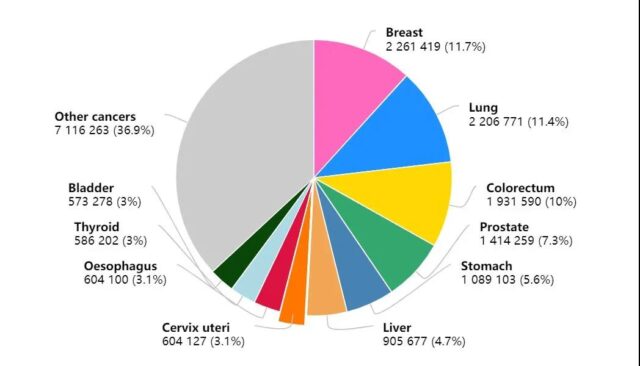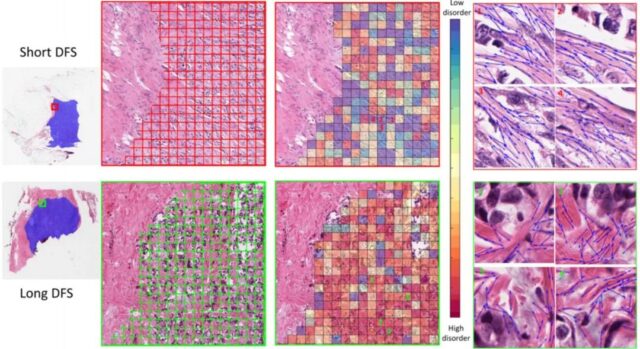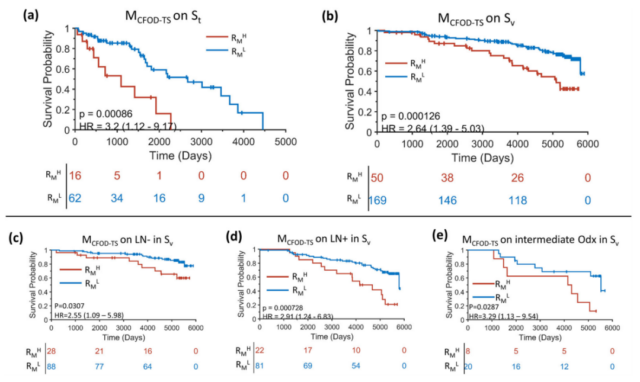AI technology predicts whether breast cancer will recur after treatment
- Aspirin: Study Finds Greater Benefits for These Colorectal Cancer Patients
- Cancer Can Occur Without Genetic Mutations?
- Statins Lower Blood Lipids: How Long is a Course?
- Warning: Smartwatch Blood Sugar Measurement Deemed Dangerous
- Mifepristone: A Safe and Effective Abortion Option Amidst Controversy
- Asbestos Detected in Buildings Damaged in Ukraine: Analyzed by Japanese Company
AI sorts the situation by collagen to predict whether breast cancer will recur after treatment
AI technology predicts whether breast cancer will recur after treatment. In January 2021, the International Agency for Research on Cancer (IARC) of the World Health Organization released the latest global cancer burden data for 2020. The latest morbidity, mortality, and cancer development trends of 36 cancer types in 185 countries around the world are estimated.
This latest estimate shows that in 2020, there will be 2.26 million new cases of breast cancer worldwide, surpassing the 2.2 million cases of lung cancer. Breast cancer will replace lung cancer and become the world’s largest cancer. At the same time, breast cancer is also the cancer with the largest number of female deaths.
 The top ten cancer types with the number of new cancer cases in 2020
The top ten cancer types with the number of new cancer cases in 2020
On August 6, 2021, researchers from Case Western Reserve University in the United States published a research paper titled: Artificial Intelligence aids in discovery of new prognostic biomarkers for breast cancer in the journal npj Breast Cancer.
Collagen is a common protein found throughout the body (including breast tissue). Previous studies have shown that the arrangement of collagen networks or fibers is closely related to the aggressiveness of breast cancer.
The research team used artificial intelligence (AI) to analyze early routine breast cancer biopsy samples from breast cancer patients and confirmed that the ordered collagen network is a key biomarker for aggressive tumors and breast cancer recurrence. The disordered collagen network can prevent the invasion of cancer cells and help prevent recurrence after chemotherapy and other cancer treatments.

Professor Anant Madabhushi, the corresponding author of the study, said that the results of this study sound counterintuitive, but we can understand that the collagen network is like a highway. If the shape of the highway is bad, then cancer cells will be difficult to migrate, and if The roads are very orderly, and cancer cells are more likely to free-rider.
The research team said that this study is of great significance, and it validates the results of previous published studies-an ordered collagen network means a worse prognosis.
At present, if you want to observe the sorting of collagen, you need to use an expensive and rare electron microscope, and this research can complete the prediction work only through the digital images after simple tissue slices, which can make more doctors and no resources equipped with advanced imaging Microscope hospitals are easier to predict outcomes and help doctors develop more aggressive treatment plans.
The entire prediction process is based only on a data set of conventional tissue samples, from tissue biopsy HE stained slides of patients diagnosed with early estrogen receptor positive (ER+) breast cancer. Estrogen receptor positive (ER+) breast cancer accounts for 80% of breast cancer patients, which also means that the AI prediction method can be used for most breast cancer patients.


Finally, the research team stated that the model established in the study was validated on a complete clinical trial data set, so it provides a higher level of evidence on the effectiveness of collagen as a marker and will enter prospective clinical trials verify.
(source:internet, reference only)
Disclaimer of medicaltrend.org
Important Note: The information provided is for informational purposes only and should not be considered as medical advice.



